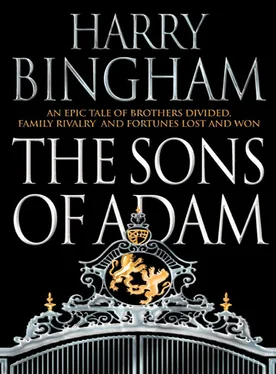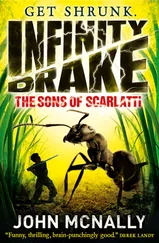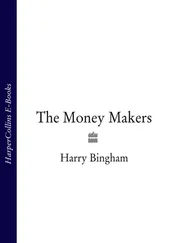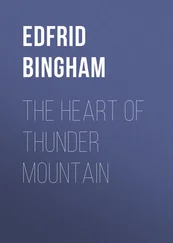The Canadian looked round with a smile. ‘Mitch Norgaard,’ he said. ‘Hi.’
They exchanged the information that prisoners always exchanged. Norgaard had been in Hetterscheidt since December 1915. Although in a Canadian regiment, Norgaard was actually an American citizen. He’d signed up because his mother was Belgian and he’d been appalled by the outrages committed by some German soldiers in Belgium during the first few days of the war.
‘So I figured I ought to sign up and let them commit outrages against me as well. I guess my plan worked even better than I hoped.’
‘You’re a Yank? I thought –’
‘Yeah, yeah. The Canadian regiments weren’t allowed to admit us. Well, they weren’t. But they did.’
‘Lucky you.’
‘Yeah, right.’
Tom filled Norgaard in on his own story: regiment, date of capture, work detail.
Norgaard nodded. ‘Red Cross?’ he asked.
Tom shook his head. ‘Missing, presumed dead,’ he said.
‘You’re kidding.’ Norgaard’s expression became deeply serious, as though Tom had just admitted to a terminal illness, which in a way he had. Most prisoners survived by supplementing their prison rations with parcels sent by the Red Cross from Geneva, but if you were recorded as ‘missing, presumed dead’ then the humanitarian bureaucracy had nothing to offer. ‘Thanks to your Royal Navy, Fritz can’t feed himself properly, let alone look after his prisoners. You won’t survive without food parcels.’
Tom shrugged and yanked at his waist. His belt was already fastened one notch tighter than normal and his trousers already beginning to balloon.
‘Friends and family?’ pursued Norgaard. ‘You should write. Get that “presumed dead” horseshit sorted out.’
Tom shook his head. ‘No.’
‘What the hell do you mean, no? You must have someone.’
Tom swallowed. He knew how serious his situation was, of course. But Alan had tried to kill him and he would be damned if he’d beg for help from the Montague family now. There was still his father, of course, but Tom knew how close Jack Creeley was to the Montagues, and writing to Jack was hardly different from writing direct to Sir Adam. He shook his head.
‘I won’t do it,’ he said. ‘I’d sooner die.’
It was the first cold day of autumn. There was only one fire in the room and Alan was cut off from its warmth by a long wooden table and the three well-padded bottoms that sat behind it.
The middle bottom belonged to a colonel in the RAMC. The two outer bottoms belonged to a pair of RAMC captains, ordinary family doctors who had joined up for the duration of the war. Between them, the three bottoms and their owners constituted a Medical Board, gathered to review Alan’s case, among many others.
‘Anderson?’ said the colonel.
‘No, sir. Montague.’
‘Not Mr Anderson?’ The colonel’s tone of voice implied Alan’s response was verging on insubordination.
‘I’m afraid not, sir, no. My name’s Montague. Captain Montague.’
And it was true. In acknowledgement of his services during the battalion’s tragic assault on German lines, Alan had been promoted to captain and recommended for the Military Cross.
‘Hmm … Ah! Montague.’ The colonel found the right papers. ‘Knocked about a bit by a shell. Nothing broken. Nothing hurt. Takes more than a Jerry shell to stop you, eh?’
Alan didn’t answer. It was now more than a month since Tom’s death and Alan was still in shock. It was as though the shell blast had never stopped ringing in his ears and heart. Worse than that, despite remaining under medical supervision away from the front line, his lungs seemed to grow worse by the day. But he hadn’t cared. In a self-destructive mood, he had asked the Medical Board to rate him A1, ‘fit for active service at the front’.
The colonel said, ‘You feel ready to go into the line once again?’
‘Yes, sir,’ said Alan, conscious that he was lying.
‘And, of course, you’re desperate to take another crack at Jerry?’
Alan ignored the question, but the colonel didn’t need an answer. ‘Good man,’ he said, looking sideways at the two captains for their approval. But the captains were dubious.
‘Can you run without difficulty?’
‘Have you attempted to carry a heavy load?’
‘How well do you think you would tolerate the sound and concussion of shelling?’
‘Do you think you are capable of commanding men under severe conditions? Bear in mind that the safety of your men will depend upon you.’
Alan didn’t like to lie outright and his answers were visibly hesitant. The short interrogation ended.
‘Excuse us a second, would you, Montague?’ said the colonel, and proceeded to talk with his two colleagues in a low tone. Alan could hear the colonel saying, ‘What the devil are we here for, if not to get men back into active service?’ The two captains on either side were obviously disagreeing strongly, pointing at Alan’s recent medical records for evidence. Alan sat in the cold room, waiting for their verdict. He chafed his hands together for warmth.
Then the doctors stopped their muttering and the colonel spoke again.
‘Look here, Montague, we can’t quite agree. These chaps worry you may not be ready to face Fritz again just yet. Do you –’
But he was interrupted. Unseen by both the colonel and Alan, one of the captains lifted a file of paper and brought it slamming down onto the desk. The noise was like a pistol shot.
Although not consciously scared, Alan’s body was no longer under his control. He jumped about a yard into the air and when he came down he was white as chalk, shaking, wide-eyed. His breathing had the liquid gurgle of a gas victim.
There was a moment’s silence.
The only sound in the room was the crackle of the fire and the tortured sound of Alan’s lungs fighting for air.
The colonel nodded sadly. Thank you, Montague. That will be all.’
It was a week later.
Tom’s body grew thinner, his clothes grew baggier. His work at the soda factory grew ever more punishing as his body weakened. Every day, morning and evening, Mitch Norgaard told him to pick up a pen and write home asking for help. Every day, morning and evening, Tom said no. But on the seventh day, Tom caved in. Since there was nothing else to swallow, he swallowed his pride. He wrote home. He wrote to his father, Jack, and to Sir Adam and Lady Pamela.
He got no answer.
He wrote again.
Still no answer.
‘So what?’ said Norgaard. ‘Write again. Write to everyone you know. Write to everyone you’ve ever heard of. Go on writing till you get an answer.’
But Tom shook his head. War turns a man half crazy and prison camp is there to finish the process. Tom laid down his pen and never wrote again.
It was an error, understandable perhaps, but still horribly mistaken.
What Tom didn’t know was this. His first pair of letters was on a hospital ship bound for Dover when the ship was torpedoed and sunk. The second pair of letters was on a Red Cross lorry heading through the Black Forest to Switzerland. The lorry was set upon by hungry men hoping for food. The contents were ransacked. The letters were lost.
Tom would be ‘missing, presumed dead’ until the war ended or he died.
‘Darling, boy!’ It was Pamela who met Alan off the train at Winchester. She hugged him tight, burying her face in his neck. When she at last released him, her face was wet. ‘My poor loves, my poor loves.’ She was crying for Tom, whom she’d loved as a mother, and crying for Alan, who’d lost a brother. Alan was unable to speak in reply.
Читать дальше












